J. Krishnamurti was born in South India and educated in England. Hailed by many from early youth as a spiritual teacher, he rejected adulation and leadership in order to encourage spiritual freedom and understanding. He devoted his life to speaking and counseling, traveling in the U.S.A., Europe, India and other parts of the world, addressing thou sands of people, always pointing the way to individual discovery of truth.
These Commentaries on Living are published in three volumes: First, Second, and Third Series.
Copyright 1956, by Krishnamurti Foundation of America
Original edition 1956
Published by Krishnamurti Foundation of America
Library of Congress Cataloging-in-Publication Data is available
eBook conversion by M-Y Books

Creative Happiness
THERE IS A CITY by the magnificent river; wide and long steps lead down to the waters edge, and the world seems to live on those steps. From early morning till well after dark, they are always crowded and noisy; almost level with the water are little projecting steps on which people sit and are lost in their hopes and longings, in their gods and chants. The temple bells are ringing, the muezzin is calling; someone is singing, and a huge crowd has gathered, listening in appreciative silence.
Beyond all this, round the bend and higher up the river, there is a pile of buildings. With their avenues of trees and wide roads, they stretch several miles inland; and along the river, through a narrow and dirty lane, one enters into this scattered field of learning. So many students from all over the country are there, eager, active and noisy. The teachers are pompous, intriguing for better positions and salaries. No one seems to be greatly concerned with what happens to the students after they leave. The teachers impart certain knowledge and techniques which the clever ones quickly absorb; and when they graduate, that is that. The teachers have assured jobs, they have families and security; but when the students leave, they have to face the turmoil and the insecurity of life. There are such buildings, such teachers and students all over the land. Some students achieve fame and position in the world; others breed, struggle and die. The State wants competent technicians, administrators to guide and to rule; and there is always the army, the church, and business. All the world over, it is the same.
It is to learn a technique and to have a job, a profession, that we go through this process of having the upper mind stuffed with facts and knowledge, is it not? Obviously, in the modern world, a good technician has a better chance of earning a livelihood; but then what? Is one who is a technician better able to face the complex problem of living than one who is not? A profession is only a part of life; but there are also those parts which are hidden, subtle and mysterious. To emphasize the one and to deny or neglect the rest must inevitably lead to very lopsided and disintegrating activity. This is precisely what is taking place in the world today, with ever-mounting conflict, confusion and misery. Of course there are a few exceptions, the creative, the happy, those who are in touch with something that is not man-made, who are not dependent on the things of the mind.
You and I have intrinsically the capacity to be happy, to be creative, to be in touch with something that is beyond the clutches of time. Creative happiness is not a gift reserved for the few; and why is it that the vast majority do not know that happiness? Why do some seem to keep in touch with the pro found in spite of circumstances and accidents, while others are destroyed by them? Why are some resilient, pliable, while others remain unyielding and are destroyed? In spite of knowledge, some keep the door open to that which no person and no book can offer, while others are smothered by technique and authority. Why? It is fairly clear that the mind wants to be caught and made certain in some kind of activity, disregarding wider and deeper issues, for it is then on safer ground; so its education, its exercises, its activities are encouraged and sustained on that level, and excuses are found for not going beyond it.
Before they are contaminated by so-called education, many children are in touch with the unknown; they show this in so many ways. But environment soon begins to close around them, and after a certain age they lose that light, that beauty which is not found in any book or school. Why? Do not say that life is too much for them, that they have to face hard realities, that it is their karma, that it is their fathers sin; this is all nonsense. Creative happiness is for all and not for the few alone. You may express it in one way and I in another, but it is for all. Creative happiness has no value on the market; it is not a commodity to be sold to the highest bidder, but it is the one thing that can be for all.
Is creative happiness realizable? That is, can the mind keep in touch with that which is the source of all happiness? Can this openness be sustained in spite of knowledge and technique, in spite of education and the crowding in of life? It can be, but only when the educator is educated to this reality, only when he who teaches is himself in touch with the source of creative happiness. So our problem is not the pupil, the child, but the teacher and the parent. Education is a vicious circle only when we do not see the importance, the essential necessity above all else, of this supreme happiness. After all, to be open to the source of all happiness is the highest religion; but to realize this happiness, you must give right attention to it, as you do to business. The teachers profession is not a mere routine job, but the expression of beauty and joy, which can not be measured in terms of achievement and success.
The light of reality and its bliss are destroyed when the mind, which is the seat of self, assumes control. Self-knowledge is the beginning of wisdom; without self-knowledge, learning leads to ignorance, strife and sorrow.

Conditioning
HE WAS VERY CONCERNED with helping humanity, with doing good works, and was active in various social-welfare organizations. He said he had literally never taken a long holiday, and that since his graduation from college he had worked constantly for the betterment of man. Of course he wasnt taking any money for the work he was doing. His work had always been very important to him, and he was greatly attached to what he did. He had become a first-class social worker, and he loved it. But he had heard something in one of the talks about the various kinds of escape which condition the mind, and he wanted to talk things over.
Do you think being a social worker is conditioning? Does it only bring about further conflict?
Let us find out what we mean by conditioning. When are we aware that we are conditioned? Are we ever aware of it? Are you aware that you are conditioned, or are you only aware of conflict, of struggle at various levels of your being? Surely, we are aware, not of our conditioning, but only of conflict, of pain and pleasure.
What do you mean by conflict?
Every kind of conflict: the conflict between nations, between various social groups, between individuals, and the conflict within oneself. Is not conflict inevitable as long as there is no integration between the actor and his action, between challenge and response? Conflict is our problem, is it not? Not any one particular conflict, but all conflict: the struggle between ideas, beliefs, ideologies, between the opposites. If there were no conflict there would be no problems.
Are you suggesting that we should all seek a life of isolation, of contemplation?
Next page
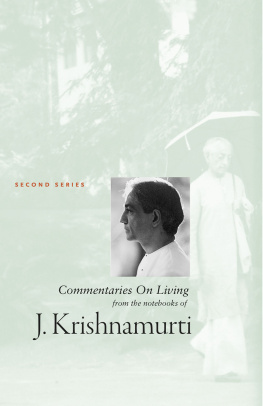
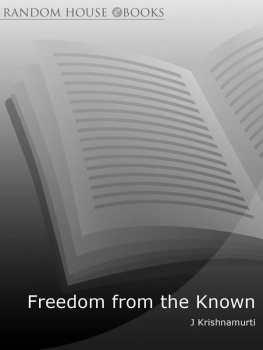

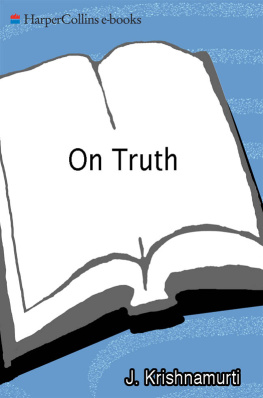

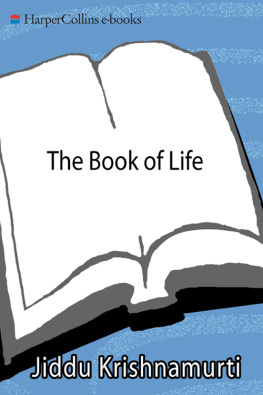
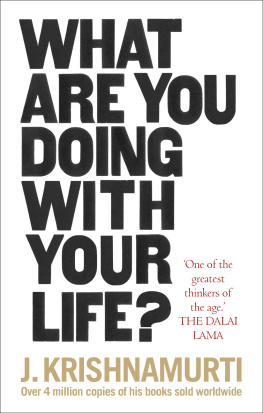
 Creative Happiness
Creative Happiness